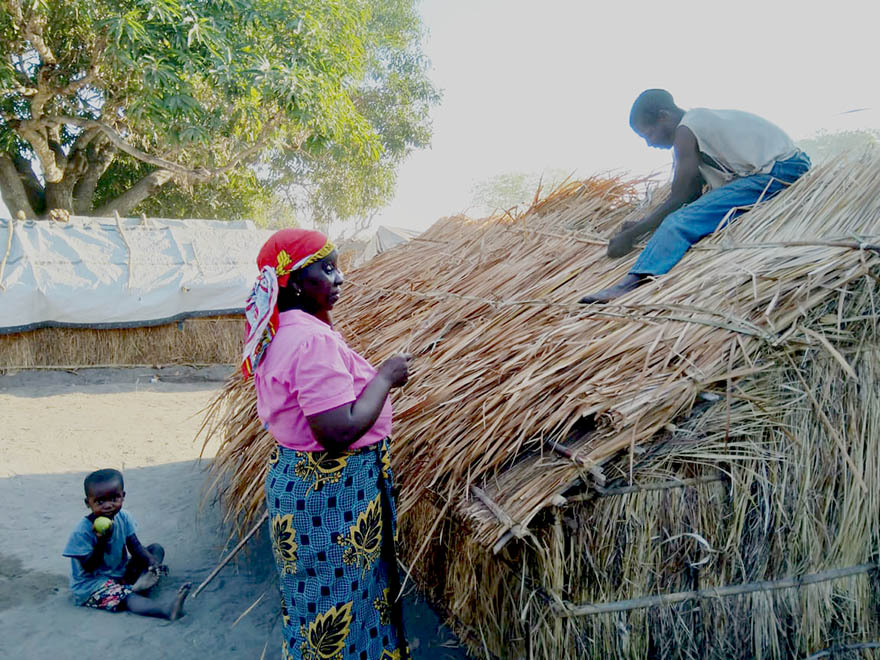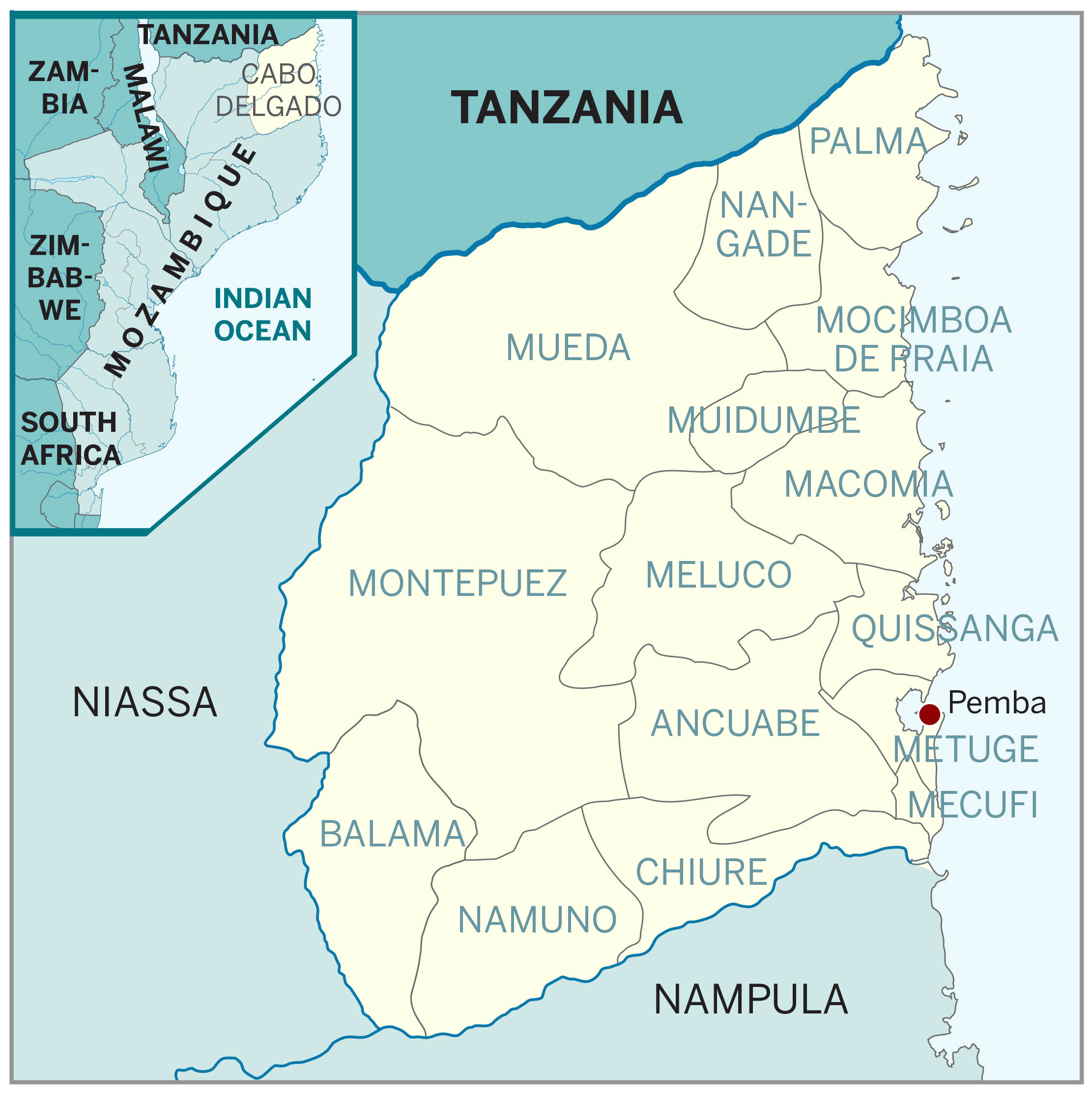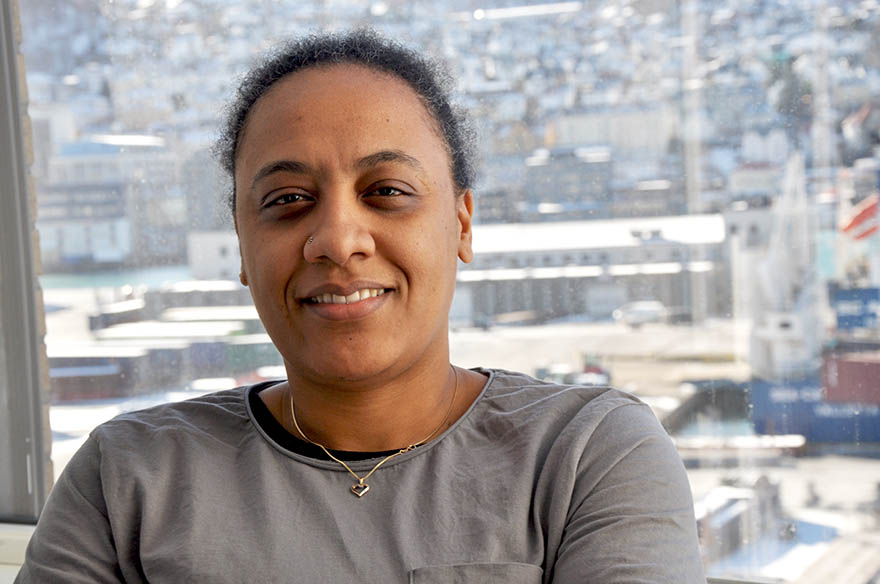Weak social contract prolongs conflict in Mozambique

Reinforcing houses in a camp for internally displaced people in Metuge, Cabo Delgado. Photo: UPC
Since 2017, terrorism has plagued Cabo Delgado province in northern Mozambique. Some 4,000 people have been killed and up to 800,000 internally displaced. One of the reasons behind the protracted conflict, according to research, is that the state constantly breaches the social contract with its citizens.
%20Bibiana%20Simao.jpg)
Bibiana Simão.
Insurgents came to Bibiana Simão’s village in September 2020. They burnt down the houses and killed everyone they could find. She left everything behind and escaped with only the clothes she had on. After several days in the bush, she reached a camp for fleeing villagers. Since then, Simão has lived in a displaced people´s camp in Metuge, not far from the provincial capital Pemba.
“Here we have nothing. We are just sitting waiting for food because we don’t have land to farm or tools to use. But we cannot go back home. It is not safe”, Simão says.
%20Armando%20Henrique.jpg)
Armando Henrique.
There are ten similar camps in the district of Metuge alone, providing shelter to 155,000 people. In some places, the influx of people fleeing has tripled the local population, putting enormous pressure on food security in an already tough situation.
“Tensions arise because resources are scarce. The local inhabitants complain that they do not get the same food support as displaced persons. And those who have fled feel they have lost their dignity because they are farmers and used to working and providing for themselves”, says Armando Henrique, provincial coordinator for National Peasants’ Union (UNAC).
%20CristinaURodrigues_210830.jpg)
Cristina Udelsmann Rodrigues.
An NAI research project External link. is looking at how informal temporary settlements become permanent
External link. is looking at how informal temporary settlements become permanent External link. over time. Settlements studied in Angola, Democratic Republic of the Congo and Zambia began as camps for people fleeing from violence, similar to the case of Cabo Delgado.
External link. over time. Settlements studied in Angola, Democratic Republic of the Congo and Zambia began as camps for people fleeing from violence, similar to the case of Cabo Delgado.
According to NAI researcher Cristina Udelsmann Rodrigues, when authorities do not offer solutions the people in such camps make the places permanent themselves.

“That also means, however, that the settlements are likely to have make-do solutions for electricity, sanitation and so on. The government in Mozambique needs to closely watch so the camps in Cabo Delgado don’t become permanent without having basic services for the inhabitants”, Udelsmann Rodrigues notes.
Some of the camps in Cabo Delgado are already more or less permanent, according to Henrique. In those, UNAC helps people with tools, seeds as well as negotiating land titles for the displaced people. Other camps are only temporary and without any development assistance. However, Simão has lived in a temporary settlement for 18 months. It is still not safe to go back to her home village.
Cabo Delgado insurgency
Islamist extremists began their attacks in October 2017.
The insurgents pledged allegiance to the Islamic State in June 2019 and began calling themselves the Islamic State’s Central Africa Province. A couple of months later, the Mozambique army launched counterattacks, with support from Russian private security company the Wagner Group.
Rwandan troops, alongside a military deployment from the Southern African Development Community, arrived to assist the army in July 2021. Despite initial success in pushing back the insurgents, terrorist attacks have continued during 2022.
“When this situation arose, we were all taken by surprise. Political conflicts between Frelimo and Renamo we know well, but we never expected violence that also involves ethnic and religious dimensions”, says anthropologist and former NAI scholarship holder Carmeliza Rosário.
Together with colleagues at Norwegian research institute CMI, she is working on a research project External link. aiming to understand the causes of the conflict in Cabo Delgado.
External link. aiming to understand the causes of the conflict in Cabo Delgado.
According to Rosário, several contributing factors are at play. One of them is a radical version of Islam that has spread in the province over the past decade; in some cases, influenced by foreign jihadism.
Another factor is ethnicity. It never used to be a source of conflict in Mozambique, despite a few attempts to stir up ethnic tensions. However, the political struggle between Frelimo and Renamo has exacerbated those tensions in some parts of the country. Certain groups have become associated with one or the other political movement. This is particularly true in Cabo Delgado, with old grievances existing between ethnic Makondes and Mwanis, according to Rosário.
The election of Nyusi was perhaps good for the country, but bad for Cabo Delgado.

Carmeliza Rosário.
Filipe Nyusi in 2014 became the first president of Mozambique to come from the north of the country. It raised hopes that economic and political power would finally equalise in the southern-dominated country. However, Nyusi belongs to Cabo Delgado’s ethnic Makonde group.
“The election of Nyusi was perhaps good for the country, but bad for Cabo Delgado. There, it has perpetuated the view that Makondes are advantaged at expense of other groups”, Rosário says.
Ethnic divisions have coincided with religious division, too. Makondes are generally Christian, while Mwanis are predominantly Muslim. However, Rosário points out, the insurgents are not targeting Christians more than Muslims, but rather the opposite, attacking those who do not practise their version of Islam.
Religion and ethnicity partly explain the conflict, but Rosário does not think it tells the complete story. The recruitment of new rebels and the army’s failure to control the situation bear evidence of something else.
Civil war and political violence
Mozambican independence movement Frelimo took power in 1975, following the end of Portuguese colonial rule. Rebel group Renamo in 1975 began fighting the socialist government, with backing from neighbouring Rhodesia (present-day Zimbabwe) and South Africa. The civil war, exacerbated by Cold War politics, lasted until a peace agreement in 1992. Over 1 million people were killed and 5 million were displaced in the region. The two movements became political parties after the war, with Frelimo always in government and Renamo in opposition. However, after disputed results in the 2014 elections a faction of Renamo took up arms again. Clashes occurred frequently until 2021, particularly in the central provinces of the country.
“The state has for a long time been very repressive and violent towards its citizens – especially in Cabo Delgado and the other provinces in the north. Years of unfair treatment by government officials have made people view the state if not as an enemy, then at best as someone who doesn’t care about their wellbeing”, Rosário observes.
There are many examples of injustices in Mozambique, she explains, and it is always vulnerable people who suffer most.
“To win a public tender you need to have contacts; to get a job you need to know someone; at the hospital you need to pay a nurse to get a blanket or something to eat. Medicine is out of stock at the pharmacy because someone stole it to sell on the side. The police give you a fine for selling your products on the street — and take the stuff with them in the process”.
However, it is not only petty corruption that leads to frustration in society, Rosário says. A long and complex court case is currently underway in Maputo involving secret billion-dollar loans that were taken with the knowledge of high-ranking government officials. The money has gone, but the debt remains, whose economic implications low-income citizens will feel for a long time. In addition, many have lost employment or livelihoods when big companies have allied with the government to push them off farmland or artisanal mining sites.
“All this combined creates frustration and desperation, and also a sense that the state is not helping me but working against me. Radicalised and violent young people are not uncommon in the world. But building a movement that actually threatens the state can only happen where the social contract is weak”, Rosário observes.
“The problem, then, is that the only solution to the crisis is to improve trust between authorities and citizens, which is not done overnight – it will take a long time”, she concludes.
TEXT: Johan Sävström
